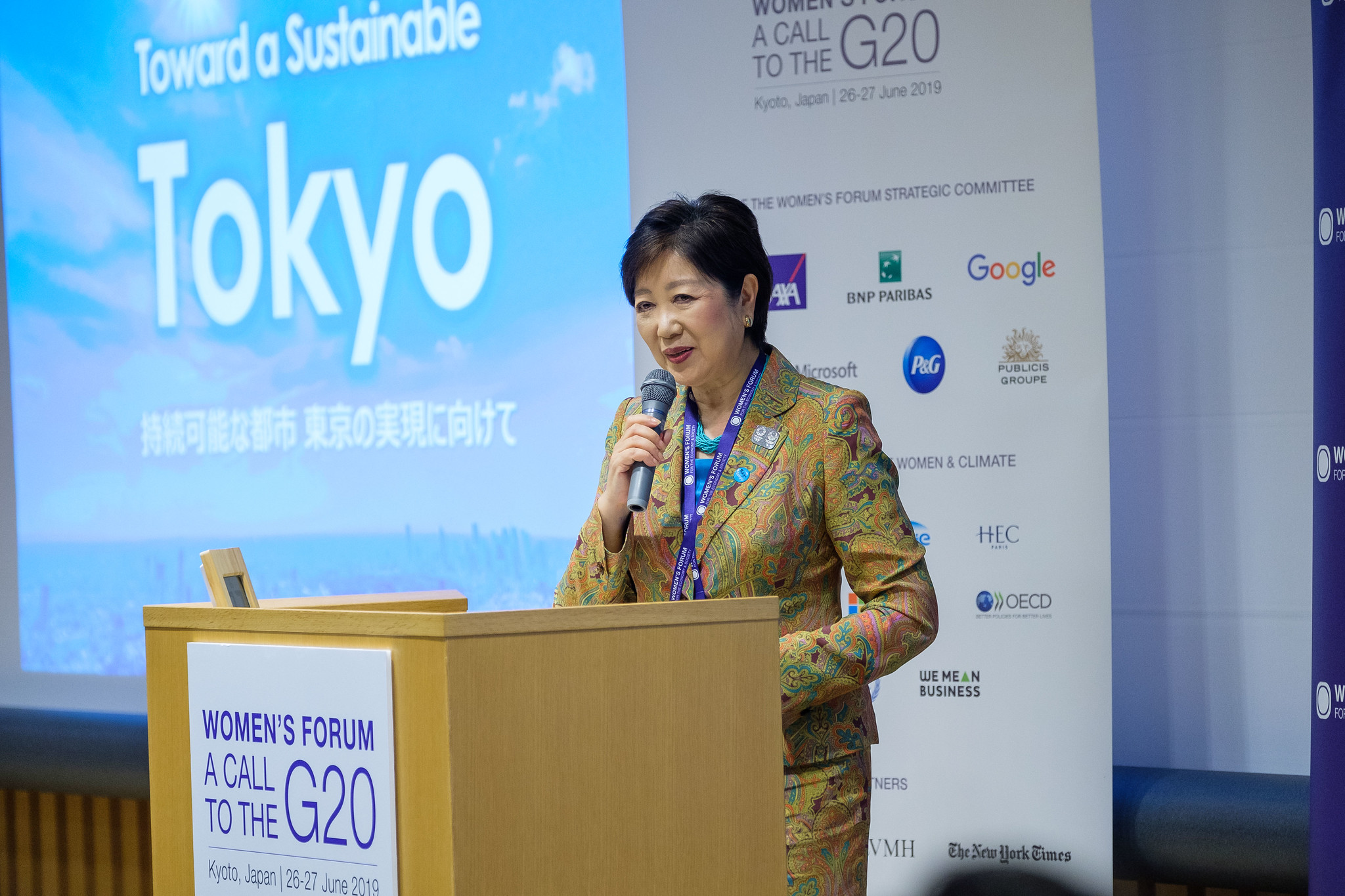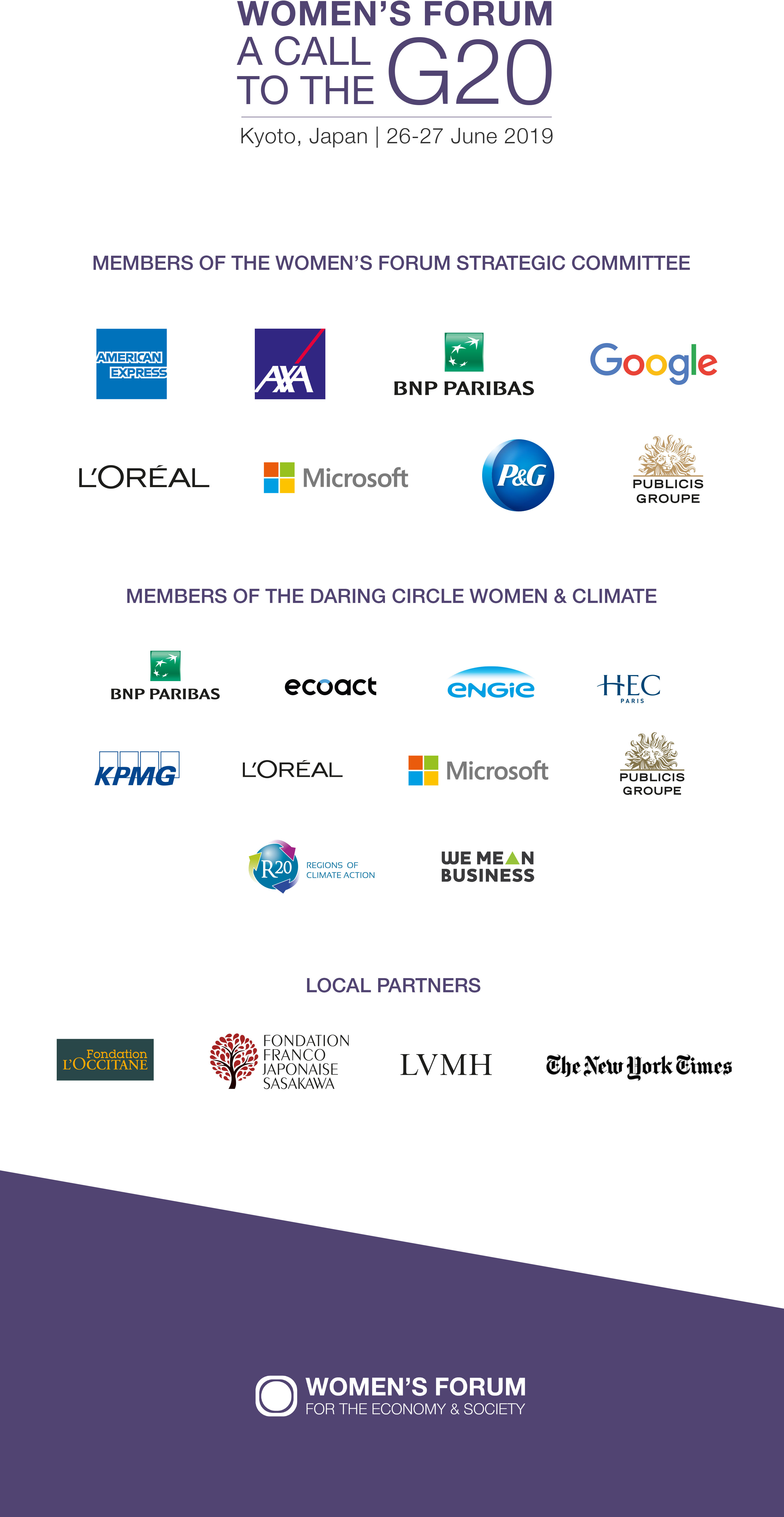26-27 JUNE 2019KYOTO

Taking the lead for inclusion: Women leading climate action Women's Forum Kyoto 2019
Women’s Forum Kyoto will took place 22 years after the birth of the landmark Kyoto Protocol, in the historic Daisen-In Temple. Our urgent mission is to amplify the voice and vision of women, and highlight their added value in tackling climate change, where their leadership is paramount.
Around the world, international institutions, governments and communities increasingly acknowledge that women are disproportionately affected by climate change. But at the same time, women are also making ground-breaking contributions to climate action in international diplomacy, legal and policy innovation, and science and technology, among other fields. But what comes next?
‘Business as usual’ doesn’t just apply to fossil fuels. What are the risks of a business-as-usual approach to gender if the pace of gender inclusion remains slow and where women’s leadership is not a core part of climate action? Is it possible to have a sustainable future without gender equality? Conversely, how can gender inclusion and women’s leadership speed up the transition to a green economy – a transition urgently needed to protect against catastrophic climate change?
The Women’s Forum’s Daring Circle on Women & Climate seeks those answers and examines the critical relationship between women’s empowerment and climate action. We have identified key areas - finance and entrepreneurship, access to energy, and STEM (science, technology, engineering and mathematics) skills – where women’s access and participation accelerate the green economy transition. In turn, the green economy creates opportunities to deepen gender inclusion by supporting more stable, peaceful and resilient environments where people of all genders can thrive.
For the first time ever, the Women’s Forum Kyoto: A Call to the G20, under the theme Women leading climate action brought the insights from our proprietary research to drive the discussions and make strong recommendations.
Progress on climate action, and indeed all the Sustainable Development Goals, risks stalling inclusion if not pursued. Within the G20 and globally, however, the picture for gender inclusion is mixed despite national efforts. Japan’s ‘womenomics’ strategy to tap women’s talent for its shrinking workforce has faced headwinds, for example. However, this gap represents an enormous opportunity to strengthen not only women’s contribution to climate efforts, but also for climate measures to advance gender inclusion in turn.
The Women’s Forum Kyoto gathered a selected group of 50 high-level, committed leaders from G20 countries and beyond, from business, the non-government sector, government to examine key levers for accelerating climate action via gender equality, and to present solutions and scalable projects:Access to energy: How access to energy, and decent green jobs, advance women’s participation and leadership in the green economy
Access to finance: Why women’s leadership and entrepreneurship are needed to kickstart climate action
Women in STEM: Why women’s skills are needed in STEM fields to strengthen climate mitigation and inclusive resilience
Our charter was delivered to Shinzo Abe, Prime Minister of Japan to enrich the work of the G20 and its commitments to create a favourable environment for women’s leadership in climate action.
Around the world, international institutions, governments and communities increasingly acknowledge that women are disproportionately affected by climate change. But at the same time, women are also making ground-breaking contributions to climate action in international diplomacy, legal and policy innovation, and science and technology, among other fields. But what comes next?
‘Business as usual’ doesn’t just apply to fossil fuels. What are the risks of a business-as-usual approach to gender if the pace of gender inclusion remains slow and where women’s leadership is not a core part of climate action? Is it possible to have a sustainable future without gender equality? Conversely, how can gender inclusion and women’s leadership speed up the transition to a green economy – a transition urgently needed to protect against catastrophic climate change?
The Women’s Forum’s Daring Circle on Women & Climate seeks those answers and examines the critical relationship between women’s empowerment and climate action. We have identified key areas - finance and entrepreneurship, access to energy, and STEM (science, technology, engineering and mathematics) skills – where women’s access and participation accelerate the green economy transition. In turn, the green economy creates opportunities to deepen gender inclusion by supporting more stable, peaceful and resilient environments where people of all genders can thrive.
For the first time ever, the Women’s Forum Kyoto: A Call to the G20, under the theme Women leading climate action brought the insights from our proprietary research to drive the discussions and make strong recommendations.
Progress on climate action, and indeed all the Sustainable Development Goals, risks stalling inclusion if not pursued. Within the G20 and globally, however, the picture for gender inclusion is mixed despite national efforts. Japan’s ‘womenomics’ strategy to tap women’s talent for its shrinking workforce has faced headwinds, for example. However, this gap represents an enormous opportunity to strengthen not only women’s contribution to climate efforts, but also for climate measures to advance gender inclusion in turn.
The Women’s Forum Kyoto gathered a selected group of 50 high-level, committed leaders from G20 countries and beyond, from business, the non-government sector, government to examine key levers for accelerating climate action via gender equality, and to present solutions and scalable projects:
Our charter was delivered to Shinzo Abe, Prime Minister of Japan to enrich the work of the G20 and its commitments to create a favourable environment for women’s leadership in climate action.


